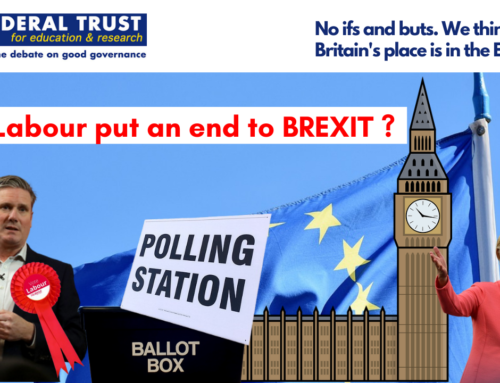With the deadline for a deal being reached now centring around the 15th October European Council meeting, there are some signs of greater willingness to compromise on the two major issues of fishing rights and state aid. If that is so it may also pave the way to making progress in other areas of the negotiations. Particularly important is the issue of freedom to provide financial services across the EU which the UK has enjoyed for decades through a system of ‘passporting.’ This system, based on the principle of ‘mutual recognition’, has allowed any financial firm regulated by the UK monetary authorities to sell their products all across Europe without a need for setting up an office there- and vice versa.
Unfortunately, this ends with the end of the transition period on 31st December this year. We then have to face the prospect of a new system based on judgments about ‘equivalence’ that may allow some areas of cross border sales of financial services to take place through a decision by the UK and the EU to recognise each other’s regulation as ‘equivalent’ even though each jurisdiction’s regulatory requirements may differ in some respects. This gives some comfort. But the decision to grant equivalence may be withdrawn at any time by either side, thus creating uncertainty. “Equivalence” is also granted service by service, not necessarily for all products.
There have also been some movements in the negotiations regarding areas such as Euro Clearing. At the height of the eurozone crisis the ECB originally wanted centres that act as middlemen between buyers and sellers of Euro denominated financial instruments, the so called ‘central counter parties’ (CCPs), to be located in the Euro area in the interest of financial stability and the effectiveness of the ECB’s monetary policy. What we saw in 2019 however, as part of the Brexit negotiations at the time, was that the EU agreed provisional legislation that allowed systemically important CCPs in third countries to continue to operate in this area to contain the cost of increased fragmentation[1]. Under that legislation, “derecognition” is now a last resort. New proposed EU legislation will allow the status quo to continue it seems until mid-2022[2]. This is clearly beneficial to the UK, in the short term at least.
The willingness to be accommodating in other financial sector areas will however crucially depend on what progress there may be on reaching an acceptable overall trade deal and avoiding a no-deal Brexit at the end of transition. The example of the inability to offer banking services for UK nationals in the EU is a clear demonstration that this loss of passporting has wider implications. Moving to ‘equivalence’ would not be sufficient in this context, as there is no equivalence provision within the central EU regulatory system for bank deposits and lending. There is still the possibility for banks to take advantage of national regulation that exists in some EU countries that explicitly allows third country firms to provide some services cross-border. But in practice UK banks are already setting up entities in the EU to serve EU resident customers. According to the ECB that will mean an extra €1.2trillion of assets will have been transferred by UK based banks to their EU operations[3] by the end of the process.
Another area of equivalence concerns the way stock exchanges are regulated. The latest concern and subject of discussion this week is the risk that shares in European companies will not be allowed to be traded in London post-Brexit. That would create problems for stocks with dual listings in the City. At present the EU’s “share trading obligation” rule limits the right of EU investors to trade shares on exchanges outside the EU bloc once a particular share has been admitted to trading within the EU.
What this does is once again put the spotlight on the need to progress with agreement on the regulatory alignment of stock exchanges, something that recently bedevilled EU/Swiss relations. European firms fear being locked out of what is at present a deep and liquid pool of funds in London in a way that would make raising funds potentially more expensive and constrain growth. Currently more than 50% of Eurozone non-financial corporations’ equity issuance is done through non Euro area owned banks with a very large percentage of them located in the City of London. The share of global investment banks, mostly operating through London, in the issuance of debt by Eurozone non-financial corporations was some 46% in 2019. UK-based dealers also play a significant role in the euro area credit default swap market (CDS) though they are less prominent in the interest rate swap market. UK dealers generally play a useful role by acting as major intermediaries between the EU and the rest of the world’s financial markets[4]. And according to ECB supervisory information and calculations, banks relocating capital market activities to the EU, such as sales, commodity and other trading and treasury activities will be transferring a total of €837billion of assets from London. This of course may end up being larger if a no deal is anticipated and/or eventually materialises.
All this should of course benefit the Eurozone’s financial hubs. ECB information suggests that the main areas of relocation are Germany, the Netherlands, France and Ireland. But for these hubs to operate efficiently they need to develop strong supporting ecosystems, as exist now in London. Setting up such an ecosystem is not an easy task and will not have happened by 2022 or any time soon after. But the desire to do so explains the latest push from the ECB for a faster move to capital markets union and completing the banking union. For the UK to still retain a prominent position in financial services in the EU agreements on equivalence, though very much second best, need to come as soon as possible.
Notes
[1] https://blogs.lse.ac.uk/brexit/2020/02/17/eus-post-brexit-policy-on-euro-clearing-explained/
[2] https://www.ft.com/content/2de23b12-5f77-44db-8e29-c3999491b2e7 (paywall)
[3] https://www.ecb.europa.eu/pub/fie/article/html/ecb.fieart202003_01~690a86d168.en.html
[4] https://www.ft.com/content/ef73bdf0-fb0b-4d97-9069-802ced63f754 (paywall)





